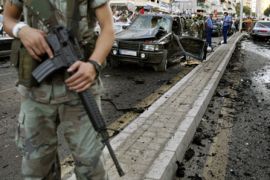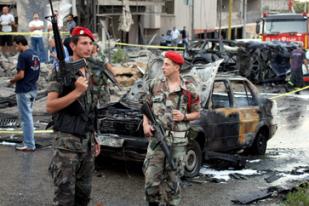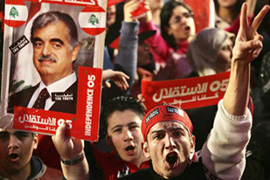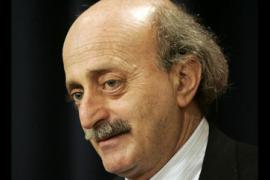Political killings blight Lebanon
A series of assassinations bodes ill for the democratic process.

 |
| The killing of Ghanem is the third such assassination of a March 14 MP since November [AFP] |
The assassination of Antoine Ghanem, a Maronite Christian MP and member of the Phalange party, is the latest in a string of attacks against Lebanese political figures aligned to the March 14 bloc, which holds the majority in parliament.
The attack comes as Lebanon’s divided political communities ready themselves to elect a replacement for Emile Lahoud, the current president, who is considered to have close ties to Syria, Lebanon’s neighbour.
Ghanem is the second member of the Phalange party to be killed since November 2006, and the third March 14 member to be assassinated in the same period.
Members of the March 14 Forces say that Ghanem is the latest member of the parliamentary majority to be killed by agents of Syria, whose forces left Lebanon in April 2005.
The departure of Syrian troops and security from Lebanon was hastened by widespread Lebanese public protests in the wake of the February 2005 assassination of Rafiq al-Hariri, a former Lebanese prime minister and critic of Syria.
Pattern of attacks
 |
| Syrian forces left Lebanon after widespread protests in the wake of al-Hariri’s killing [AP] |
No group or individual has been prosecuted for any political killings in Lebanon, highlighting the continued paralysis of the country’s security services.
“Since February 2005, there have been all these political assassinations, and despite the independence of the heads of the new Lebanese security, we still cannot find a trail who is behind … all of the assassinations,” Marwan Bishara, Al Jazeera’s senior political analyst, says.
The UN has ratified a tribunal into Hariri’s killing after assiduous work by the March 14 Forces bloc to force an international court – despite the deep reservations of Shia party Hezbollah, Lahoud and Nabih Berri, Lebanon’s parliament speaker and a key member of the opposition.
The pattern of attacks since the al-Hariri assassination, combined with the March 14 Forces failing to reach consensus with the Hezbollah-led political opposition over power sharing, has deepened the rift between the rival camps and pushed Lebanon to the edge of civil war.
The extent to which the majority and the opposition have failed to reach agreement was illustrated in November 2006 when the opposition pulled all its cabinet members out of the government, in protest at what they saw as a lack of power in decision-making.
| Lebanon on edge | ||
|
|
The March 14 Forces have consistently refused to enter into a national unity government with the opposition, arguing that such an agreement would give the opposition an effective veto over any decisions made in cabinet.
Given that Hezbollah has strong support from Syria, the majority bloc believes that Hezbollah and its allies would use such powers to block initiatives deemed unpalatable by Damascus.
Meanwhile, Hezbollah and its allies insist that the March 14 bloc is in the pocket of the US and UK – countries which held back from demanding an immediate ceasefire as Israel bombed Lebanon in its war against Hezbollah in July-August 2006.
Representatives threatened
Amid this backdrop of mutual distrust, Lebanon has witnessed a string of new assassinations in recent months, which have steadily reduced the number of March 14 MPs in the parliamentary chamber.
Pierre Gemayel, a young cabinet minister, was shot in his car in a Beirut suburb in November 2006. Walid Eido, a staunch critic of Syrian influence over Lebanon, was killed in a massive bomb blast on the capital’s seafront in June 2007.
Key figures in the March 14 Forces, such as Walid Jumblatt, leader of the Progressive Socialist Party, have alleged that the killings are part of a programme by Syria to reduce the March 14 bloc to an amount below a simple majority – the amount needed to elect a president if no agreement on a presidential candidate can be reached.
 |
| Jumblatt says the killings are part of a Syrian plot to undermine Lebanese independence [AP] |
“Because we were on the verge of going to the parliament and because we still have the majority, the only way to reduce the majority is through the classical bloody answer – and that is assassination,” Jumblatt told Al Jazeera.
Jumblatt says that the pattern of killings is part of a project by Syria and its proxies in Lebanon to reduce the number of March 14 Forces parliament members to 64 – which would lead to the loss of their majority in the 128-member parliament.
“We were 69 before [the death of Ghanem], now we are 68,” he says.
“They have to kill four more of us to able to say to the Lebanese: ‘you won’t vote for the independent president of Lebanon’.”
Consensus candidate
Although leading members of the March 14 bloc say that Syria has a hand in the latest killing, Bishara says it is far too early for anyone, even in Lebanon, to apportion blame for Ghanem’s assassination.
“What each one of these people could express is only an opinion on who is behind it [the assassination]. Because [Jumblatt] may be anti-Syrian, you may think it was Syria. But also anyone who wanted to hurt Syria today would carry out this assassination in order to out Syria in the accusation box once again.”
With the March 14 Forces refusing to cede ground to the Syrian-supported opposition over power-sharing in the cabinet, the opposition is pulling out all the stops to get the majority to agree on a consensus parliamentary candidate.
Berri has suggested that if a consensus candidate can be reached, the opposition will drop its demands for a government of national unity.
Saad al-Hariri, leader of the Future party within the March 14 bloc and son of assassinated Rafiq al-Hariri, has not yet committed to the proposal but Foaud Siniora, Lebanon’s prime minister, has said it is “worth considering”.
As the Lebanese people wait for their elected leaders to enter the parliament building on September 25 for the first-round of voting towards a president, rumour and counter-rumour over the assassinations will continue to be traded.
It is difficult to imagine that even the smoothest presidential election can solve all of Lebanon’s internal problems overnight.
